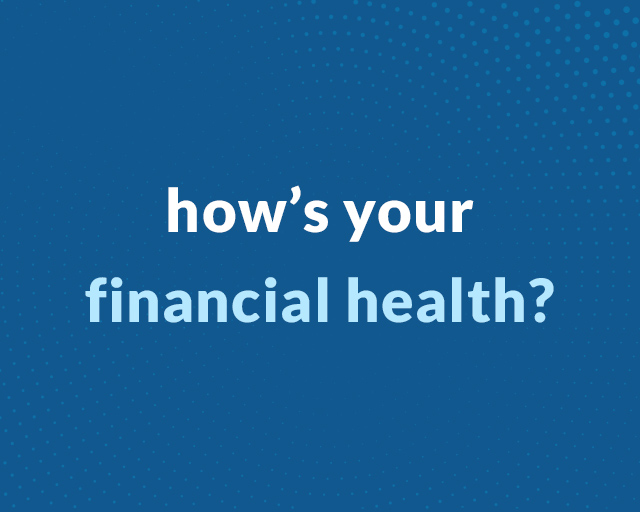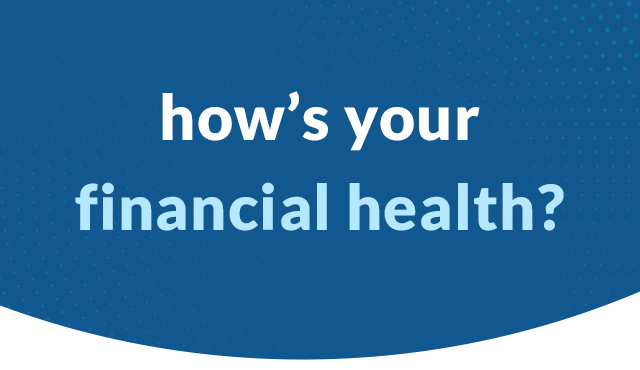

How’s your financial health? Take this quick quiz and keep track of your answers to determine if you need to brush up on the basics or maintain what you’re doing for your financial future.
are you familiar with credit scores and credit reports?
yes
Don’t forget to check your scores and reports regularly and make sure your information is up to date.
no
Start by learning the difference. Your credit score is a number that lenders use to determine how likely you are to pay back a loan. Your credit reports are a summary of your personal credit history. Did you know you’re entitled to one free report from each of the three reporting agencies per year? This is a good place to start your financial health journey.
do you have a savings account?
yes
Keep building it up to achieve longer-term financial goals.
no
A savings account helps you stash money away for emergencies, specific goals and purposes, so if you’re able, set up a savings account with your bank and contribute when you can. Every dollar matters!
do you have a budget?
yes
Your expenses, income and priorities may change over time, so don’t forget to occasionally check in on your budget to make sure it’s still working for you.
no
A basic budget can take less than an hour to set up. It’s an easy way to keep your finances on track, as well as help you save for bigger goals and expenses in the long run.
do you keep an eye on how you spend money?
yes
Continue spending mindfully and recognizing needs vs. wants, and your savings will thank you for it.
no
This is where your budget will come in handy. Giving each dollar a job may help you cut down on “want” spending, use credit cards less and even get rid of unnecessary expenses.
are you taking steps to build and maintain your credit score?
yes
Actively working on your credit score is helpful for your credit future.
no
This is the next step after becoming familiar with your credit score and credit reports. Making on-time monthly payments, paying down existing debt whenever possible, and using credit and opening new credit only when necessary are all ways to build and maintain good credit history.
are you saving for financial goals?
yes
This shows you’re actively managing your finances. Remember to save for both short-term (rent, travel, or home improvements for example) and long-term (retirement, college tuition, or mortgage payments for example) goals.
no
If a big-ticket financial goal like a home or a car doesn’t seem possible right now, smaller financial goals such as the short-term goals we mentioned are important to save for in case of emergency.
do you have an emergency fund?
yes
This is a great way to ensure that in times you may need to use the fund, you won’t have to rely on credit cards or savings that are meant for other expenses.
no
Speaking of goals, an emergency fund is a good financial goal to have. It’s ok to start small but aim at having at least a few months’ worth of living expenses saved.
are you managing your debt?
yes
This is an important part of building and maintaining your credit score.
no
This doesn’t only mean paying your debt off. This means having a plan to lower your debt, and working on your budget and understanding your spending habits as we mentioned before.
Have you started saving for retirement?
yes
This is a big priority for many people. Since you’re saving now, you may be able to have more time to enjoy your retirement.
no
Slow and steady wins the race here. Start saving now, even small amounts here and there. Also, check to see if your employer has a 401k program. With a 401k, you can save part of your paycheck automatically.
are you able to invest some of your money?
yes
Again, this is helpful for your credit future. You’re putting your money to work for you, and potentially earning more to accomplish long-term goals.
no
This one, at least for the time being, isn’t crucial to your financial future. After you’ve achieved some of the other priorities on this list, consider looking into investing to potentially earn more money.
If you said yes to 7 or more
you most likely have a handle on your finances. A good next step here is working on the questions you may have answered no to and to keep maintaining your finances.
If you said yes to 4-7
you’re on your way to good credit health. Keep working on checking off more in the yes column.
If you said yes to 3 or less
don’t worry. Pick one of your no responses that seems the most manageable, and start there. Then, when you feel comfortable, move on to another one. Good financial health is key to a more comfortable financial future.
Here are some other resources that may help:
https://blog.fingerhut.com/a-budget-can-improve-your-relationship-with-your-money/
https://blog.fingerhut.com/eight-tips-for-people-who-want-to-build-or-rebuild-credit/
https://blog.fingerhut.com/smart-financial-goals-can-help-turn-your-dreams-into-reality/









